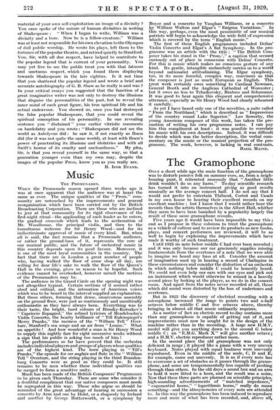Music
THE PROMENADES.
WHEN the Promenade season opened three weeks ago it was at once apparent that the audience was at heart the same as ever. The unique qualities of the "Prom." com- munity are untouched by the improvements and general reorganization which have been carried out by the British Broadcasting Corporation. There are those who are inclined to jeer at that community for its rigid observance of the first-night ritual—the applauding of each leader as he enters, the gradual crescendo which leads to the acclamation of Mr. Woodhouse, the principal violin, and then to the tumultuous welcome for Sir Henry Wood—and for its indiscriminate approval of music of every kind. But, when all is said, the fact remains that a Promenade audience, or rather the ground-bass of it, represents the core of our musical public, and the future of orchestral music in this country depends upon its good favour. Moreover, it is one of the most loyal communities in the country. The fact that there are in London a great number of people who, having walked the floor of some shop all day, are willing for dear life's sake to walk the floor of the Queen's Hall in the evening, gives us reason to be hopeful. Such evidence cannot be overlooked, however mixed the motives of the Promenaders may be.
The audience in the Grand Circle on the opening night was not altogether typical. Certain sections of it seemed rather aloof and critical, and the intonation of American voices which was to be heard in the interval supplied an explanation. But those others, forming that dense, omnivorous assembly on the ground floor, were just as continuously and uncritically enthusiastic as they have always been. Everything was to their taste, the bright, hard colours of Rimsky-Korsakov's "Capriccio Espagnol," the refined lyricism of Mendelssolm's Violm Concerto, the hearty brilliance of "Till Eulenspiegel's Merry Pranks," the raciness of the "William Tell" Over- ture, Stanford's sea songs and an air from "Louise." What an appetite I And how wonderful a man is Sir Henry Wood to supply this nightly fare for eight successive weeks without a sign that his public is asking too much of him ! The performances so far have proved that the orchestra includes individual players and groups of players whose qualities are of the highest kind. The horn playing in "Till's Pranks," the episode for cor anglais and flute in the" William Tell" Overture, and the string playing in the third Branden- burg Concerto were as good as they could be. It still remains to be seen whether these individual qualities can be merged to form a sensitive unity.
Much has been made of the British Composers' Programmes to be given each Thursday. -There are some who consider it a doubtful compliment that our native composers must needs be segregated in this way. Those who argue so should be reminded of the great advantage of hearing in succession a concerto by Arne and one by Hoist, or a rhapsody by Ireltuid dad another by George Butterworth, or a symphony by Boyce and a concerto by Vaughan Williams, or a concerto William Walton and Elgar's "Enigma Variations." In this way, perhaps, even the most pessimistic of our musical patriots will begin to acknowledge the wide field of expression which is covered by the term "English music." The first of these English programmes included Delius' Violin Concerto and Elgar's A flat Symphony. In the pro- gramme was an article with the title : The British Com- poser takes his stand in the Prom.'," a caption that seemed curiously out of place in connexion with Delius' Concerto. For this is music which makes no conscious gesture of any kind. Its gentle, intangible melancholy carries us to a world beyond nationalist attitudinizing. The Edgar symphony, too, in its more forceful, complex way, convinces us that the composer is just as much European as English. This treat work certainly owes something to Cardinal Newman, General Booth and the Anglican Cathedral of Worcester - but it owes no less to Tchaikovsky, Braluns and Schumann. It was good to hear again this eloquent and comprehensive utterance, especially as Sir Henry Wood had clearly rehearsed it carefully.
As yet I have heard only one of the novelties, a suite called "From the Northland," which is described as "Impressions of the country round Lake Superior." Leo Sowerby, the young American composer of this work, has taken the pre- caution of writing his own programme notes. I can pay him this compliment at least : it was possible to correlate his music with his own descriptions. Indeed, it was difficult to decide which was the better description, the verbal com- mentary on the music or the musical projection of the pro- gramme. The work, however, is lacking in real contrasts.
BASIL MAINE,
































 Previous page
Previous page